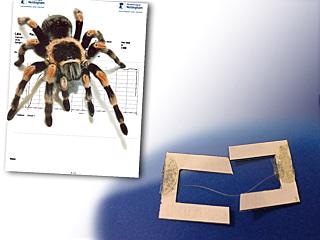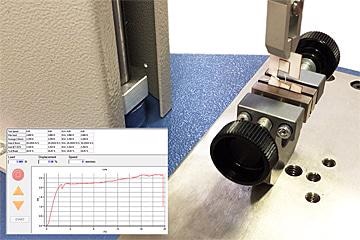A global education facility, The University of Nottingham has campuses in Malaysia, China and the United Kingdom. A depth of expertise in the fields of Zoology, Anatomy, Physiology, Pharmacology, Microbiology, Genetics, Biochemistry and Molecular and Cell Biology can be found in the School of Life Sciences within the Faculty of Medicine and Health Sciences.
This wide range of expertise places the University of Nottingham at the forefront of Medical Science and Biological research. One particular project is involved in molecular genetic studies of spider silk and extensive knowledge of this topic has relevance in many fields from pure education to future engineering applications.
Working with colleagues across the University, including the Nanoscience and Nanotechnology Centre, the ‘Spider Lab’ team had to test the physical properties of specific types of this natural protein.
However, the fiber test specimens are usually only a few tens of microns in width, even though the raw materials are generated by some of the largest members of the infra order – for instance the Mexican red knee tarantula (Brachypelma smithi). Hence, in addition to the highest levels of accuracy, the solution demanded delicate yet secure gripping for valid research data.

Mexican Red Knee Tarantula with Silk Sample and Holder.
Solution

Lightweight Grips, Spring-loaded and Rubber-faced.
A computer-controlled test stand was delivered by Mecmesin, with an appropriately rated load cell and fixtures, selected to optimize resolution at the maximum expected tensile forces.
The test procedure is controlled by the emperor™ software
and the programming environment enables specific calculations to be carried out to systematically characterize the performance of the silk sample. Measurement of extension rate, average load over specific extension ranges, work performed, elongation and load at break are recorded.
Thus, this broad analysis provides a better understanding about the variability amongst silks (and between strands of the same silk type). The library files make sure that the same extension test is repeated several times for the same fiber, or ‘bundles’ of fibers which replicates the natural ecological use of the material.
By bonding the fiber or fibers to a card ‘frame’, which is cut in two before the test, the test sample is secured. The precision specification is completed by lightweight grips - spring-loaded clamping for the upper and rubber-faced jaws in the lower.
System
- Lightweight double action vice grip with rubber-faced jaws
- Lightweight mini vice grip
- 2 N intelligent load cell
- MultiTest 2.5-i computer-controlled test stand (Superseded by the OmniTest 2.5 universal testing machine)
Testimonial
The Mecmesin machine is a great piece of kit – it has allowed us to move forward with our research in a very productive way, and we are grateful for the excellent technical support that has come with it.
Dr. Sara Goodacre, Assistant Professor, Faculty of Medicine & Health Sciences, The University of Nottingham

This information has been sourced, reviewed and adapted from materials provided by Mecmesin.
For more information on this source, please visit Mecmesin.